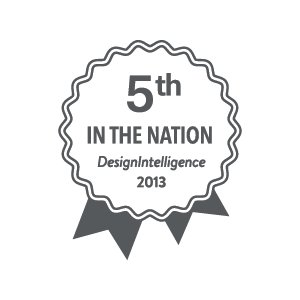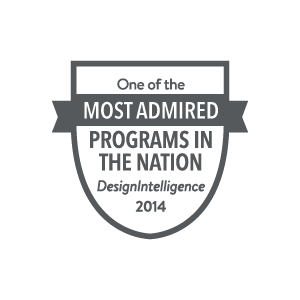
Department of Consumer and Design Sciences
Accreditation and Certification
Council for Interior Design Accreditation (CIDA)
Our Interior Design program is CIDA accredited (http://www.accredit-id.org), which means that you can be confident that this curriculum meets professional standards for quality and career preparation. The program has maintained CIDA (formerly FIDER) accreditation since 1998. We have one of the “most admired” programs in the nation (Design Intelligence, 2014), recognized as the “program of choice” for interior design education. Hiring firms also rank us among the best in educating students for communication and cross-disciplinary teamwork (Design Intelligence, 2013). Over the past five years, all graduates received job offers in design-related positions, many of those in Top 100 Architecture and Design Firms.
The interior design program leading to the Bachelor of Science in Interior Design is accredited by the Council for Interior Design Accreditation, www.accredit-id.org.
The CIDA-accredited program prepares students for entry-level interior design practice, for advanced study, and to apply for membership in professional interior design organizations. The Bachelor of Science in Interior Design granted by Auburn University meets the educational requirement for eligibility to sit for the National Council for Interior Design Qualification Examination (NCIDQ Exam). For more information about NCIDQ Exam eligibility visit: https://www.cidq.org/eligibility-requirements.
National Council for Interior Design Qualification (NCIDQ)
The Council for Interior Design Qualifications (CIDQ) is the global leader in establishing standards of competence for interior designers/interior architecture professionals. CIDQ protects the public health, safety and welfare by identifying interior designers who have the knowledge and experience to create interior spaces that are not just aesthetically pleasing, but also functional and safe. Interior designers who meet the eligibility requirements for education and experience and pass the NCIDQ exam are assigned an NCIDQ Certification number that attests to their qualifications for employers, state regulators and the general public.
NCIDQ certification is required to practice Interior Design in an increasing number of states, including Alabama. Auburn’s CIDA accredited Interior Design program provides the educational requirements for the NCIDQ. An additional 3,500 hours of qualified post-graduate work experience is required to sit for the exam.
Click here to review INDS statistics.

The CADS Interior Design program is CIDA accredited [http://www.accredit-id.org], which means you can be confident that this curriculum meets professional standards for quality and career preparation. We are among the “most admired” programs in the nation (DesignIntelligence, 2014); recognized as the program of choice for interior design education.
Hiring firms also rank us among the best in educating students for communication and cross-disciplinary teamwork (DesignIntelligence 2013). Over the last five years all graduates received job offers, many of those in Top 100 Architecture and Design Firms.





The mission of the Interior Design program, in parallel to our College, is to create a dynamic, challenging learning environment where students become professionally competent, globally aware, and socially engaged as they develop into 21st century leaders. This academic paradigm that reaches beyond the classroom to open students' minds and broaden world views, differentiates our graduates in the global marketplace. It further enables them to positively impact the health and well-being of individuals and communities, in pursuit of a sustainable world.

The goals of the Interior Design Program center on preparing graduates who:
The Interior Design Program also strives to:

We create a dynamic, challenging learning environment where students become professionally competent, globally aware, and socially engaged as they develop into 21st century leaders. Our program provides a formative and incrementally developed professional education, where each experience works in conjunction with the previous to grow the student’s body of knowledge into a substantive and meaningful whole.
Our students learn through discovery, hands-on experiences, project- and task-based learning, and collaboration. We believe that learners do not respond only to – or even best to – solutions provided by professors. They are challenged to problem-seek with faculty as the guide-on-the-side, allowing room to fail with a safety net, then formulate questions that lead to research and experimentation, and ultimately to answers. The designer’s attempts at, and the inevitable disappointment of, expectation help reveal to them the nature and depth of the design challenges they face. As a result, they learn to recognize the value of results that challenge and contradict expectations.
We expand the scope of learning through experiential opportunities that range from professional speakers to studio partnerships, field trips and professional events to internships. This academic paradigm, that reaches beyond the classroom to open students' minds and broaden world views, differentiates our graduates in the global marketplace.
We teach design empathy through doing; whenever possible, we incorporate a component of goodwill or community service into a project. This outreach component promotes a spirit of altruism and further enables students to see how their work can positively impact the health and well-being of individuals and communities in pursuit of a sustainable world.
Throughout our curriculum, students will meet rigorous standards through a highly individuated learning experience intended to shape exceptional design practitioners – competent, dependable, relevant, curious, proactive, authentic, resilient, inclusive, and enthusiastic about their work. Our vision is for our graduates to grow into designers who can see a problem before it exists and confidently ideate to find solutions. Such individuals are not easily satisfied; for them, educational drive has become synonymous with professionalism itself. Teaching our students to think for themselves is critical but teaching them to teach themselves is paramount.


Department of Consumer and Design Sciences
308 Spidle Hall
Email Us
334-844-4084